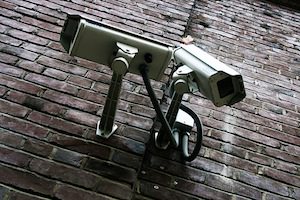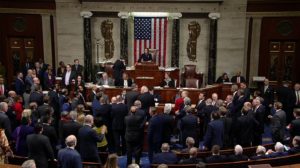‘Indefinite Surveillance’ Under the 2014 NDAA?
The National Defense Authorization Act recently approved by the House would build on powers currently available to government to allow unrestricted access to all personal data collected "during combat operations from countries, organizations, or individuals, now or once hostile to the United States," political analyst Stephen Benavides reports at Truthout.
The National Defense Authorization Act recently approved by the House would build on powers currently available to government to allow unrestricted access to all personal data collected “during combat operations from countries, organizations, or individuals, now or once hostile to the United States,” political analyst Stephen Benavides reports at Truthout.
The data are known officially as “captured records” and include any kind of personal file belonging to parties deemed to be in conflict with the United States. Of course, the war on terror’s expanding battlefield means those records do not have to be collected outside of the United States.
As Sen. Lindsey Graham said during a Senate hearing in May on the ongoing use and expansion of the Authorization for the Use of Military Force — a directive enacted by Congress in 2001 to find and capture those responsible for the 9/11 attacks — “the battlefield [or the location of ‘combat operations’ as they are described in the language of the law] is wherever the enemy chooses to make it.” Michael Sheehan, assistant secretary of defense in charge of special operations, confirmed the opinion that the “battlefield” can stretch “from Boston to the FATA [Federally Administered Tribal Areas in northwestern Pakistan].”
That means data collected anywhere officials deem to be relevant to their war against terrorism, including at home, is fair game for examination by authorities.
As Benavides reports:
On May 22, 2013 the Subcommittee on Intelligence, Emerging Threats and Capabilities, one of several Armed Services Committees, met to discuss the National Defense Authorization Act (NDAA) for Fiscal Year 2014. The main subject of the hearing was Sec. 1061, otherwise known as Enhancement of Capacity of the United States Government to Analyze Captured Records. This enhancement provision of NDAA 2014 would effectively create a new intelligence agency, one with the authority to analyze information gained under the Patriot Act, FISA, and known spying programs such as PRISM.
Sec. 1061(a) authorizes the Secretary of Defense to “establish a center to be known as the ‘Conflict Records Research Center'” (Center). The main purpose of the center, according to the bill text, is to create a “digital research database,” one with the capability to “translate” and facilitate research on “records captured from countries, organizations and individuals, now or once hostile to the United States.” The authorization also says the Center will conduct research and analysis to “increase the understanding of factors related to international relations, counterterrorism and conventional and unconventional warfare, and ultimately, enhance national security.”
In order to make the Center run, and to accomplish such an incredibly broad scope of “research,” the Secretary of Defense needs the Director of National Intelligence (DNI) to cooperate in coordinating “information exchanges important to the leadership of the United States Government.” That coordination would require participation of all 16 member agencies and departments of the U.S. Intelligence Community. This would leave James Clapper, the man accused of lying to Congress about the National Security Agency’s (NSA) domestic spying program known as PRISM, in de facto direction of another federal surveillance and data analysis agency. And while the Center would be officially directed and overseen by the Secretary of Defense, without unfettered access to secret and top secret information, the Center would become the Center would be completely ineffective. These information exchanges would most likely include data and records generated by the mass surveillance of everyday people under PRISM, as well as surveillance of those identified as “potential terrorists” or ” high value targets” by any one of those 16 intelligence agencies now in operation.
— Posted by Alexander Reed Kelly.
Your support matters…Independent journalism is under threat and overshadowed by heavily funded mainstream media.
You can help level the playing field. Become a member.
Your tax-deductible contribution keeps us digging beneath the headlines to give you thought-provoking, investigative reporting and analysis that unearths what's really happening- without compromise.
Give today to support our courageous, independent journalists.






You need to be a supporter to comment.
There are currently no responses to this article.
Be the first to respond.